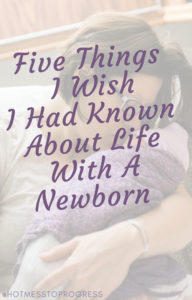
Within hours of bringing my oldest child home from the hospital as a newborn, I quickly realized I had NO clue what I was doing.
You mean they sent me home with this human being that is completely dependent on ME to take care of him? I don’t know what I’m supposed to do.
Now, don’t get me wrong. I was the typical first time mom. I read ALL the pregnancy books, even the ones that made birth seem like a terrifying experience instead of something beautiful. But, I digress.
I thought I knew what was getting myself into with this baby. I had read about breastfeeding, parenting styles, what to expect in each age and stage, etc. I took the CPR class. I chose to use cloth diapers. I tried to do everything as naturally as possible. I exercised during pregnancy.
I thought that my skills caring for my younger nieces and nephews, years of babysitting experience and natural mothering instinct would be sufficient to help me be the best mother I could be.
I was woefully unprepared.
Postpartum Anxiety & Depression
Of course, the books I read during pregnancy and all of the mommy forums warned about the possibility of postpartum depression and anxiety. The nurses sent me home from the hospital with a baby and a stack of papers that included symptoms of postpartum depression. That stack of papers stayed in the nursery untouched for WEEKS.
Like many mothers, I assumed that my maternity leave and postpartum time would be rainbows, butterflies and lots of joyful bonding time with my newborn. Well, there was LOTS of time to bond with him during our sleepless nights, cluster feeding breastfeeding sessions (more on that later) and any other time he wouldn’t let me put him down.
But one day, it hits. You may not realize it in the moment, but it hits. That feeling you can’t quite put a finger on, but you just don’t feel like the person you were yesterday or the person you were a week ago. Postpartum depression and anxiety have a long list of feelings, emotions and actions that are related to these mental health issues.
And here’s what caused me to think I didn’t have PPD or PPA with my first child: my feelings didn’t match the symptom list. I couldn’t check off all the boxes on the symptom list the doctor gave me AND I was able to pass the Edinburgh Postnatal Depression Scale (EPDS) test with flying colors. Yet, I still didn’t feel like myself with my first child. I masked the pain and eventually it went away (well, until I got pregnant again).
Here is a link to some common symptoms of both postpartum depression and postpartum anxiety. They are not mutually exclusive, meaning it’s okay to feel some symptoms of PPD and some symptoms of PPA. And if you feel NONE of these symptoms, that’s okay too. There are many mothers out there who don’t fall prey to PPA or PPD and it’s not your fault if you do or do not.
Possible symptoms of Postpartum Anxiety
Possible symptoms of Postpartum Depression
Breastfeeding Problems
Just like I assumed everything would come together with rainbows and butterflies, I assumed the reading from the baby books would be sufficient. Breastfeeding is natural, right? If the baby can do the breast crawl and latch on his own, then there’s not that much more to it, right?
Let’s all pause a moment while I say “Bless your poor little heart, dear mama.” My naive self had NO idea. And if you’re pregnant for the first time, please don’t let this scare you. But, I really wish I had understood that it would be HARD some days.
While breastfeeding is wonderful for mom and baby, it’s not always easy and it doesn’t always happen successfully or easily for mom and baby. As a new mom, it’s important to be armed with support and knowledge about breastfeeding if you intend to make it successful.
Here are just a small handful of common stressors with breastfeeding:
If you don’t know that any of these issues are COMMON with breastfeeding, especially in the early days, you could doubt your ability to successfully breastfeed your newborn. The links above are excellent resources for reading and gaining more confidence in breastfeeding.

I always suggest trying to connect with a local breastfeeding group in your area such as La Leche League or a breastfeeding peer counselor if you are connected with WIC through your local health department. You can also seek out the help of a lactation consultant from your hospital or in your town. The lactation consultants from your hospital will still provide you with advice and sometimes will see you in person even after your discharge from the hospital.
Poop Can Be Scary
None of the books I read during pregnancy told me about the postpartum poop. If you’re pregnant for the first time and reading this, let me be frank. The first poop after delivering your child can be anxiety inducing. You’ve just pushed a 8 lb bowling ball out of your vagina or just had a major surgical procedure to bring that bowling ball into the world. Now, your body wants to get things moving on the road to recovery, including removing all that junk in your bowels. Regardless of whether you had a natural birth and didn’t tear at all or have stitches in more places than you care to mention, that first poop is going to suck.
It’s going to bring back memories of labor and you’re certain that you’re not going to be able to poop without an epidural for the rest of your life. Let me tell you, the poop will come. It’s not going to be fun, but it will get back to normal soon.
You’re just going to need to load up on stool softeners, extra fiber and any other poop softening foods. Your body pretty much shut down the poop factory so that baby could make her way out. And, if you had any type of anesthesia (including an epidural) during labor it could further slow down your need to go.
Don’t overthink it too much when the time comes. But do your best to relax as it will be easier to do #2. If you have a SquattyPotty or a step stool, prop your feet up and it will help position you better. Finally, don’t be ashamed if you have to give yourself a hand. If you use counterpressure, say hold onto your vagina while you push, it may make you feel more at ease.
All The Hormones
- Hair loss
- Mood Swings
According to Ava Romm, MD “The postpartum hormone drop is considered the single largest sudden hormone change in the shortest amount of time for any human being, at any point of their life cycle.
During pregnancy, our estrogen and progesterone increase to [the] level of something like taking a hundred birth-control pills a day. By about three days postpartum you’re essentially back to a baseline that is close to non-pregnant. So if you can imagine, it’s sort of like PMS on steroids, or something like that. It’s just so sudden. Estrogen and progesterone are going from so escalated to normal that it can cause huge emotional changes.”
It can take a week or more for your body’s estrogen and progesterone levels to get back to their normal levels. During this time, it’s typical to feel some of the baby blues or other highs and lows of postpartum. Refer back to the section on postpartum depression for more information.
And once you think you are in the clear and you feel back to a “new normal,” guess what? You’re gonna lose A LOT of hair. You know how pretty and thick your hair was during pregnancy? Well, sorry sister. It’s going to fall out in big chunks in the shower and when you brush.
Don’t freak out. It’s actually quite normal. All that estrogen and progesterone during pregnancy causes our hair to be in a constant state of growth. Once it comes back down after birth, our body goes into a kind of resting stage for around three months before new growth starts again. It’s at this time we start seeing lots of “baby hairs” and the clumps of hair in our brush.
It’s Lonely
And finally, but I think most importantly is to realize that being a mom can be one of the loneliest jobs out there. Sure, all of your friends showered you with gifts and attention while pregnant, but who’s going to be there when your significant other is at work and you haven’t showered in three days?
You might have been blessed with friends and family who stocked your freezer with frozen dinners for a week, but what about three weeks later when you still haven’t quite found your groove? You haven’t quite figured out how to shop with a newborn or with a newborn and older siblings.
Or even months later when you realize that you haven’t talked to many other adults other than the pediatrician and your new mommy friends on BabyCenter.
It can suck and it can even push you further into PPA or PPD. But, let me tell you. There are lots of ways to get help even if we can’t think about it in the moment. A lot of times we are too proud to ask our friend to come over and do the dishes, EVEN if she says “Call me if you need anything.” It’s okay to call on that friend. She won’t think less of you, and if she does, you probably don’t want that kind of energy around you anyways.
If you don’t have local friends or family, you can always hire a postpartum doula to come help during the first six weeks. A postpartum doula offers emotional support for the new mom, support with household tasks, errands, etc. and support for siblings and partners during the postpartum period. They can be very beneficial during the early days of your postpartum journey. If you’d like more information about postpartum doulas, comment below.


